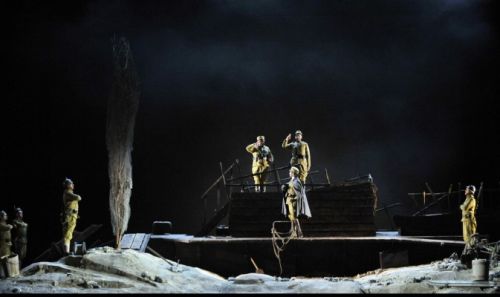 Italy Rossini: L’Inganno Felice, La Fenice Orchestra, Stefano Montanari (conductor), Teatro La Fenice, Venice, 21.9.2014 (JMI)
Italy Rossini: L’Inganno Felice, La Fenice Orchestra, Stefano Montanari (conductor), Teatro La Fenice, Venice, 21.9.2014 (JMI)
Cast:
Isabella: Marina Bucciarelli
Bertrando: Giorgio Misseri
Tarabotto: Omar Montanari
Ormondo: Marco Filippo Romano
Batone: Filippo Fontana
Production: Teatro La Fenice
Direction: Bepi Morassi
Sets, costumes and lighting: Academia di Belle Arti di Venezia
Rossini had close ties to the city of Venice, especially in his early years as a composer. It was here that his first opera, La Cambiale di Matrimonio, had its debut, and here where several of his farces had their premieres, before he finally succeeded with Tancredi at Teatro La Fenice. L’Inganno Felice is the third of his operas, and it follows another farce, L’Equivoco Stravagante, which premiered in Bologna (and will be staged in a few weeks at Biilbao’s Teatro Arriaga).
L’Inganno Felice is considered to be a semi-serious work; although some of the characters are treated as buffos, the plot is not exactly humorous, and it’s mostly without any credibility. Duke Bertrando and Isabella appear to be happily married, but the duke’s assistant, Ormondo, enraged by Duchess Isabella’s rejection of him, convinces the duke that Isabella is unfaithful. Ormondo gives orders, which are executed by Batone, to set Isabella adrift in a small boat on the ocean. The moribund duchess washes up on a beach, where she is found by Tarabotto, the head of a local mine. He saves her and cares for her, passing her off as his niece, Nisa. Ten years later the duke, who remarried and has recently been widowed, comes to the mine. Tarabotto, who has learned the true identity of Isabella, presents her to the duke as his niece. Bertrando, Ormondo and Batone are impressed by her ressemblance to the former duchess. In the end, everything becomes clear, and Isabella and Bertrando rekindle their former love.
Rossini’s music is unmistakable and always enjoyable. This is not a masterpiece comparable to his later works, but it is very pleasing to the ear.
The stage production was premiered two years ago at the Malibran Theatre, with direction by Bepi Morassi. All the work on stage ̶ sets, costumes and lighting ̶ was done by students of the Academy of Fine Arts in Venice. The action is set during World War I, which is not unreasonable considering that the duke is at war with his neighbours. There is a simple stage with a wire fence and a shed where Nisa and Tarabotto live. It’s an unpretentious production and works just fine.
Stefano Montanari’s conducting was quite good and very well suited to Rossini, with lightness and vivacity and supportive of the singers. I found his work here better than at previous times in Baroque pieces. The orchestra of Teatro La Fenice gave a solid performance.
As was the case two years ago when this production first played at Teatro Malibran, the singers are not big names, but they formed a compact team, with three buffo baritones and two brighter voices, the tenor and the soprano.
MarinaBucciarelli sang Isabella, and she left a positive impression as a light soprano with an attractive voice. She was the most promising singer in the cast, and has already had some experience in opera.
Giorgio Misseri as Duke Bertrano had no problems on the high notes, although they were not very bright.
Of the three baritones, Tarabotto is a more serious character. He was played by Omar Montanari who was the best of the three. Marco Filippo Romano did well as Ormondo, but has not much to sing. Filippo Fontana was Batone and the least interesting voice of the trio.
La Fenice was almost full, and the audience was very warm with the artists.
José Mª Irurzun
